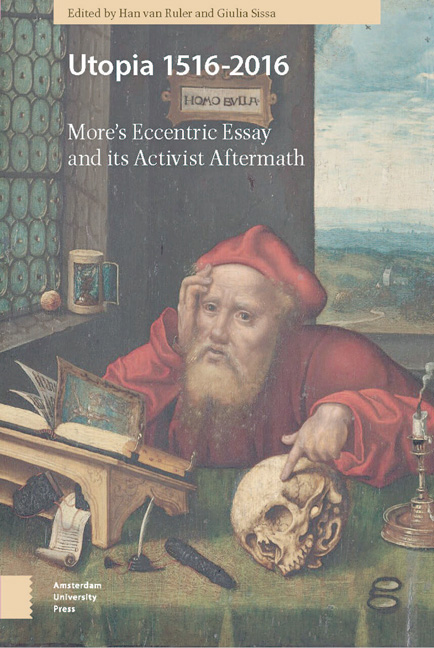Book contents
- Frontmatter
- Contents
- Introduction
- PART 1 THE BOOK
- A Praise of Pain: Thomas More’s Anti-utopianism
- Bodies, morals, and religion: Utopia and the Erasmian idea of Human Progress
- PART 2 ORIGINAL RECEPTION
- Realism Vs Utopianism: The Problem of the Prince in the Early-Modern Netherlands
- From Thomas More to Thomas Smith: Utopian and Anti-Utopian Understandings of Economic Change in Sixteenth-century England
- PART 3 PHILOSOPHICAL CRITICISM
- Reflections on the Utopian Mind
- Utopianism in Today’s Health Care
- PART 4 PHILOSOPHICAL ACCLAIM
- Utopianism and its Discontents: A Conceptual History
- The integrity of Exacerbated Ambiguity: More’s Utopia as an Evaluative Thought Experiment
- Index
Bodies, morals, and religion: Utopia and the Erasmian idea of Human Progress
Published online by Cambridge University Press: 12 December 2020
- Frontmatter
- Contents
- Introduction
- PART 1 THE BOOK
- A Praise of Pain: Thomas More’s Anti-utopianism
- Bodies, morals, and religion: Utopia and the Erasmian idea of Human Progress
- PART 2 ORIGINAL RECEPTION
- Realism Vs Utopianism: The Problem of the Prince in the Early-Modern Netherlands
- From Thomas More to Thomas Smith: Utopian and Anti-Utopian Understandings of Economic Change in Sixteenth-century England
- PART 3 PHILOSOPHICAL CRITICISM
- Reflections on the Utopian Mind
- Utopianism in Today’s Health Care
- PART 4 PHILOSOPHICAL ACCLAIM
- Utopianism and its Discontents: A Conceptual History
- The integrity of Exacerbated Ambiguity: More’s Utopia as an Evaluative Thought Experiment
- Index
Summary
Abstract
Although Thomas More's description of the Utopians’ ‘Epicurean’ position in philosophy nominally coincides with Erasmus's defence of the Philosophia Christi, More shows no concern for the arguments Erasmus gave in support of this view. Taking its starting point from Erasmus's depreciations of the body and More's intellectual as well as physical preoccupations with the bodily sphere, this article presents the theme of the human body and its moral and religious significance as a test case for comparing Erasmus and More. The treatises both men wrote on Christ's suffering in the Garden of Gethsemane confirm that both authors dealt with the notion of the body in contrasting ways: Erasmus shows a tendency to address the moral-psychological question of mentally conquering the worldly self, whilst More highlights the way in which ordinary facts and physical things may carry spiritual and religious meaning. Paradoxically, Erasmus consistently applied his spiritualized ideal of man to this-worldly moral and social concerns, whereas More focused on the physical domain out of a religious interest in transcendent truths. In line with Giulia Sissa's thesis, our hypothesis is that More ostensibly appropriated an Erasmian type of idealism in Utopia, but, contrary to Erasmus himself, focused on the exterior form of a virtuous society, rather than on its moral and spiritual preconditions. While Erasmus advocated a mental transformation towards reason, More's Utopia envisioned what might come of this.
Keywords: Utopia, epicureanism, Philosophia Christi, the human body, Christ in Gethsemane, humanism, spirituality, political idealism, moral history
Introduction
Was Thomas More ever serious in Utopia? Giulia Sissa, who put forward the idea that the book should be read as part of a literary interplay between More and Erasmus in the wake of Erasmus's Praise of Folly, offers good arguments against taking its moral and political recommendations in any straightforward way as Thomas More's blueprint for a future society. If, as Sissa argues, the figure of Hythloday is an impersonation of Erasmus, we should not identify Thomas More with the idealist he portrays, but rather ‘distinguish as sharply as possible’ between ‘More's authorship of Utopia’ and ‘[the main protagonist Raphael] Hythloday's praise of Utopia’.
- Type
- Chapter
- Information
- Utopia 1516-2016More's Eccentric Essay and its Activist Aftermath, pp. 71 - 106Publisher: Amsterdam University PressPrint publication year: 2017



